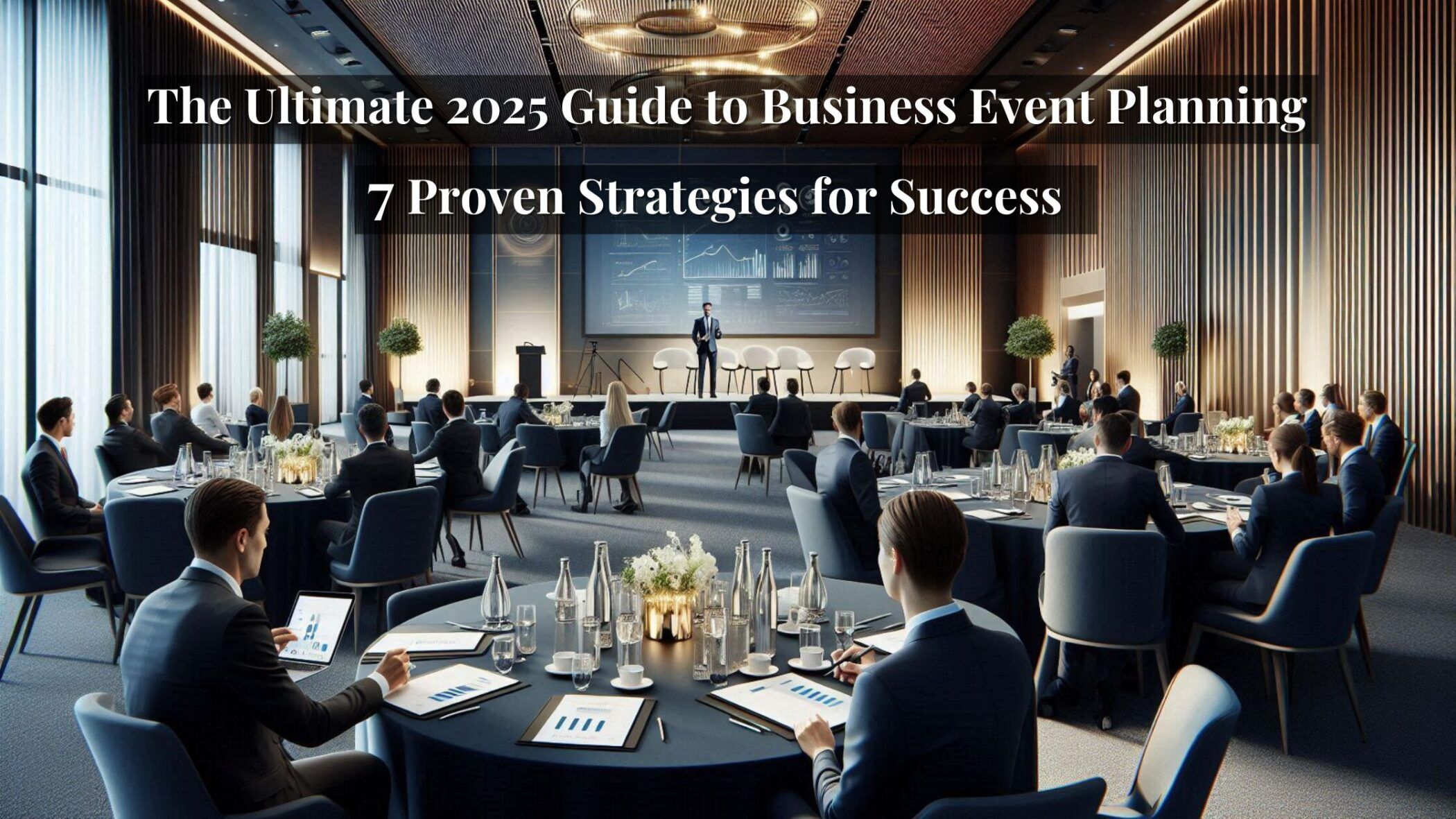
📢 The Ultimate 2025 Guide to Business Event Planning: 7 Proven Strategies for Success
Table of Contents

📢 The Ultimate 2025 Guide to Business Event Planning: 7 Proven Strategies for Success
1️⃣ What is Business Event Planning?
Planning a successful business event requires strategy, precision, and professional execution. Whether it’s a corporate seminar, product launch, or networking event, the right planning approach ensures maximum engagement and business impact.
At Spark99 Event Management, we specialize in creating exceptional corporate events tailored to your business goals. In this guide, we’ll explore the top 7 strategies to make your business events successful in 2025.
Key Elements of Business Event Planning:
✅ Setting clear objectives
✅ Managing logistics and venue selection
✅ Organizing guest speakers and entertainment
✅ Ensuring a seamless experience for attendees
2️⃣ Why Business Event Planning is Essential for Companies?
A well-executed business event helps companies:
✔ Boost brand awareness – Establishing industry presence
✔ Strengthen client relationships – Engaging with potential partners
✔ Encourage employee motivation – Building team morale
✔ Drive revenue & business growth – Generating new leads
According to Forbes Business Events, companies that invest in corporate events see a 30% increase in brand loyalty and customer engagement.
🔗 External Link: Business Events
3️⃣ 7 Steps to Successfully Plan a Business Event
Planning a business event requires a strategic approach. Here’s a step-by-step guide to ensure a smooth event execution:
Step 1: Define Your Event Goals
Clearly outline:
📌 What’s the purpose of the event? (Networking, training, product launch)
📌 Who is your target audience? (Employees, clients, investors)
📌 What outcomes do you expect? (Brand visibility, lead generation)
Step 2: Set a Realistic Budget
A detailed budget includes:
💰 Venue rental
💰 Catering & refreshments
💰 Speaker fees & logistics
💰 Marketing & promotions
💡 Tip: Use event budgeting software like Cvent to track expenses efficiently.
🔗 External Link: Cvent Event Budgeting Tool
Step 3: Choose the Right Venue
Your venue should match your event’s goals and audience needs. Key factors:
🏨 Accessibility & location
📶 WiFi & technology setup
🍽 Catering & hospitality services
Step 4: Event Marketing & Promotions
Use a mix of digital marketing strategies:
📧 Email campaigns – Targeted invitations
📢 Social media marketing – LinkedIn, Instagram, Twitter
🎟 Paid advertising – Google Ads, Facebook Ads
💡 Pro Tip: Google Events reports that events with multi-channel marketing strategies get 3x more registrations.
Step 5: Logistics & Vendor Coordination
Seamless coordination includes:
✔ Vendor contracts (Catering, AV, Stage Setup)
✔ On-site management team
✔ Technical support for virtual attendees
Step 6: Event Execution & Management
Ensure smooth flow:
🎤 Speaker coordination
📌 Real-time troubleshooting
📋 Guest registration & engagement tracking
Step 7: Post-Event Follow-up & ROI Analysis
📊 Gather feedback from attendees
📊 Analyze engagement metrics (Social shares, participation rates)
📊 Track sales conversions generated from the event
4️⃣ Choosing the Right Venue for a Corporate Event
A well-chosen venue enhances the guest experience.
Venue Checklist:
🏨 Is the location convenient for attendees?
🎤 Does it have the necessary AV equipment?
📶 Is WiFi available for virtual participation?
🍽 Does it provide catering services?
According to Eventbrite, 80% of business event attendees prefer centrally located venues for accessibility.
🔗 External Link: Eventbrite Event Planning Insights
5️⃣ Budgeting for a Business Event
A well-planned budget ensures cost efficiency.
| Expense Category | Estimated Budget (%) |
|---|---|
| Venue Rental | 30% |
| Catering | 20% |
| Marketing & Promotion | 15% |
| Speakers & Entertainment | 15% |
| Logistics & Staffing | 10% |
| Miscellaneous | 10% |
6️⃣ How to Promote and Market Your Event Effectively?
📌 Email marketing – Send personalized invites
📌 SEO optimization – Use keywords in event landing pages
📌 Social media campaigns – Target business professionals on LinkedIn
📌 Influencer collaborations – Partner with industry experts
7️⃣ Measuring Event Success: KPIs & Analytics
Track key metrics to evaluate event effectiveness:
📊 Attendance rate – Compare RSVPs vs. actual turnout
📊 Social media engagement – Track hashtags & shares
📊 Lead generation – Number of new business prospects
8️⃣ Common Mistakes to Avoid in Business Event Planning
🚫 Poor venue selection
🚫 Lack of backup plans for technical failures
🚫 Ignoring attendee engagement strategies
9️⃣ Why Hire a Professional Event Planner?
Hiring an expert ensures:
✔ Seamless execution
✔ Cost-effective solutions
✔ Maximized event ROI
Spark99 Event Management specializes in corporate event planning, delivering world-class experiences.
📢 Need expert help? Contact Spark99 Today!
FAQs
❓ How far in advance should I plan a business event?
👉 Ideally, 3-6 months in advance for smooth execution.
❓ What are the best tools for event planning?
👉 Cvent, Eventbrite, and Whova are great platforms.
❓ How can I increase business event attendance?
👉 Use email marketing, social media ads, and influencer partnerships.
❓ What’s the best way to track event success?
👉 Use Google Analytics & CRM tools to measure attendee engagement.
🎯 Conclusion: Plan Your Business Event Like a Pro!
Business event planning requires strategic execution, creativity, and professional management. By following these 7 expert strategies, you can ensure your corporate event is a success in 2025! 🚀
🔹 Need help with event planning? Contact Spark99 Event today!
